- News
- Reviews
- Bikes
- Components
- Bar tape & grips
- Bottom brackets
- Brake & gear cables
- Brake & STI levers
- Brake pads & spares
- Brakes
- Cassettes & freewheels
- Chains
- Chainsets & chainrings
- Derailleurs - front
- Derailleurs - rear
- Forks
- Gear levers & shifters
- Groupsets
- Handlebars & extensions
- Headsets
- Hubs
- Inner tubes
- Pedals
- Quick releases & skewers
- Saddles
- Seatposts
- Stems
- Wheels
- Tyres
- Tubeless valves
- Accessories
- Accessories - misc
- Computer mounts
- Bags
- Bar ends
- Bike bags & cases
- Bottle cages
- Bottles
- Cameras
- Car racks
- Child seats
- Computers
- Glasses
- GPS units
- Helmets
- Lights - front
- Lights - rear
- Lights - sets
- Locks
- Mirrors
- Mudguards
- Racks
- Pumps & CO2 inflators
- Puncture kits
- Reflectives
- Smart watches
- Stands and racks
- Trailers
- Clothing
- Health, fitness and nutrition
- Tools and workshop
- Miscellaneous
- Buyers Guides
- Features
- Forum
- Recommends
- Podcast
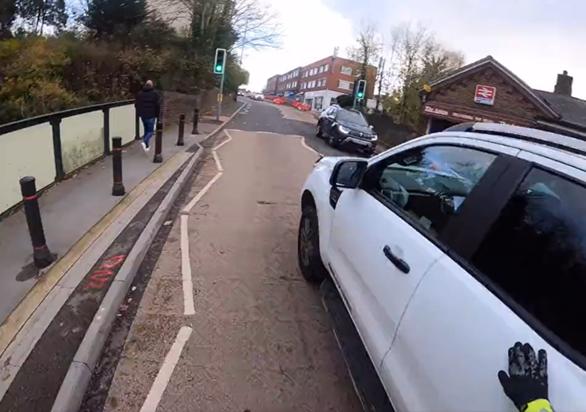 Pickup driver chases cyclist after close pass (Jay McSerk, Twitter)
Pickup driver chases cyclist after close pass (Jay McSerk, Twitter)Study finds drivers who cycle or understand recommended cyclist road positioning are less likely to blame cyclists for close passes
A newly published study has examined how drivers view close passes on cyclists, researchers looking into the effect of cycling experience, knowledge of recommended cyclist road positioning, and a driver's tendency to express anger behind the wheel on the way an individual perceives close pass incidents.
The academic research comes from Anglia Ruskin University's Centre for Sport and Exercise Science, and School of Psychology and Sport Science, and has been published in January 2024's volume of 'Transportation Research Part F: Traffic Psychology and Behaviour'.
The paper — the work of William Cubbin, Kjell van Paridon, Helen Keyes and Matthew Timmis — titled 'Close passes caught on camera – How knowledge and behavioural norms relate to perceptions of liability when cars overtake cyclists', examines responses from a sample of 239 UK drivers when shown eight video clips of close pass incidents submitted by cyclists as driving complaints to Essex Police in 2020. (Please note images used in this story are for illustration purposes only and do not show footage used in the study).
Researchers recorded the survey participants' "road use habits", including their self-defined identity on a driver-cyclist spectrum, and knowledge of recommended practice for bicycle positioning. It also identified a 'Driver Anger eXpression' (DAX) for each participant, essentially noting tendencies towards different forms of anger expression when driving, including those who use vehicle manoeuvres to express anger (such as through punishment passes).
The study found that drivers who were not cyclists apportioned greater liability to cyclists seen being close passed in the video footage. Furthermore, participants whose 'vehicleDAX' score (rating tendency to use vehicle manoeuvres to express anger when driving) was greater were less likely to agree that the close passes shown were dangerous.
Similarly, drivers with greater knowledge of recommended cyclist road positioning apportioned lower levels of liability to the cyclists being close passed than those drivers with less knowledge, suggesting that greater communication of the Highway Code and recommended safe practice for cyclists could improve drivers' attitudes on close passes.
"This is the first time that naturalistic footage reported by cyclists to police has been used to examine differing perceptions of the same close pass event," the researchers explained. "Findings show a need to share knowledge about cycling practice in order to help drivers navigate cycle traffic safely and considerately. This can inform road safety interventions that can contribute to safer cycling and driver behaviours that are more welcoming to existing and potential cyclists.
"The data shows that drivers who do not also ride a pedal cycle will apportion more liability to a cyclist reporting a close pass, than drivers who also cycle themselves. It also shows that drivers with a stronger tendency for expressing anger through vehicle manoeuvres will view close pass incidents as being of lower risk and attribute more liability to the cyclist, compared to the views of other drivers.
"Finally it has shown that better knowledge of recommended cyclist road positioning is a mediating factor that reduces the level of liability apportioned by drivers to cyclists who experience a close pass."
Of the 293 participants, 68 per cent were male and 32 per cent female. 15 per cent identified themselves as never cycling, while 7.5 per cent said they never drive. 49 per cent were 'more driver than cyclist'.
> Here's what to do if you capture a near miss, close pass or collision on camera while cycling
From a longlist of 85 close pass clips sent to Essex Police in 2020, the videos selected all showed a cyclist riding in accordance with the Highway Code who was passed by the driver of a motor vehicle from behind, and "represented a range of road widths, lateral clearances given by the motor vehicle and both presence and absence of temporary narrowing".
Participants were asked to rate pass severity via a five-point scale from 'strongly agree' to 'strongly disagree' in response to the statement "the incident was dangerous".
A similar three-part section examined opinions on liability of the cyclist and driver in each clip, while a 49-item questionnaire (Deffenbacher et al. 2002) was used to score tendency of participants towards different forms of anger expression when driving.
Information about driving experience, cycling experience, road user identity, and cycling knowledge were also noted for each participant.
The researchers concluded the findings support the hypothesis that "drivers who also ride a pedal cycle frequently or identify as cyclists will apportion less responsibility to a cyclist reporting a close pass, than drivers who do not cycle themselves".
> Cyclists wearing helmets seen as "less human" than those without, researchers find
"Further work is recommended to examine driver opinions of cyclist legitimacy in different road environments and different carriageway positions," the paper states.
"Drivers who also ride a bicycle attributed lower liability to the cyclist in close pass scenarios than drivers who do not also cycle themselves. This study adds further insight into components of this in-group bias, in particular that a shared sense of identity is not the only factor predicting lower liability attributed to cyclists.
"There appears to be a knowledge component to this relationship with 13.9 per cent of the variation in the measure for cyclist liability being predicted by variation in scores on the cycling position knowledge questions.
"This knowledge may frame the drivers' prior assumptions about cyclist behaviour in a positive way, helping them understand why a cyclist adopts a certain carriageway position or is in the road in the first place, thus reducing any tendency to suppose that the cyclist is subverting an expected norm or acting in a selfish or arrogant way."
Dan is the road.cc news editor and joined in 2020 having previously written about nearly every other sport under the sun for the Express, and the weird and wonderful world of non-league football for The Non-League Paper. Dan has been at road.cc for four years and mainly writes news and tech articles as well as the occasional feature. He has hopefully kept you entertained on the live blog too.
Never fast enough to take things on the bike too seriously, when he's not working you'll find him exploring the south of England by two wheels at a leisurely weekend pace, or enjoying his favourite Scottish roads when visiting family. Sometimes he'll even load up the bags and ride up the whole way, he's a bit strange like that.
Latest Comments
- brooksby 6 min 35 sec ago
Is it as low as 30%? I was under the impression that virtually no new cars are actually - you know - "sold" any more…
- mark1a 7 min 31 sec ago
The filler caps are often vented to allow air to escape as the liquid expands in warmer temperatures, and air to be let in as the fuel level goes...
- brooksby 7 min 44 sec ago
In the UK, even stuff like pepper spray is illegal as its only use is effectively assault, so I'm not sure that a lock like this would be safe to...
- quiff 40 min 17 sec ago
Holy thread resurrection Batman!
- mdavidford 49 min 39 sec ago
They really don't, though. They might say they do, but in reality the amount of money involved is a rounding error in the tax budget, and not worth...
- Surreyrider 53 min 17 sec ago
Don't worry, in the not too distant future the Telegraph won't have any readers. Latest calculations suggest they only have 170,000 readers (they...
- slc 1 hour 40 min ago
Agreed, although women face additional barriers in busy places too. All the women cyclists I know report a much higher level of abusive behaviour...
- Hirsute 2 hours 7 min ago
He does it to make a point. As I remember from his videos he is rarely not in control of the situation. Although as it's all on shitter these days,...
- mdavidford 2 hours 13 min ago
But if it's a bridleway or a permissive path they're within their rights to be.
- Secret_squirrel 2 hours 55 min ago
This is my favourite rant - but I really dont see the point of windproof cycling clobber that isn't properly waterproof - especially for the UK. ...
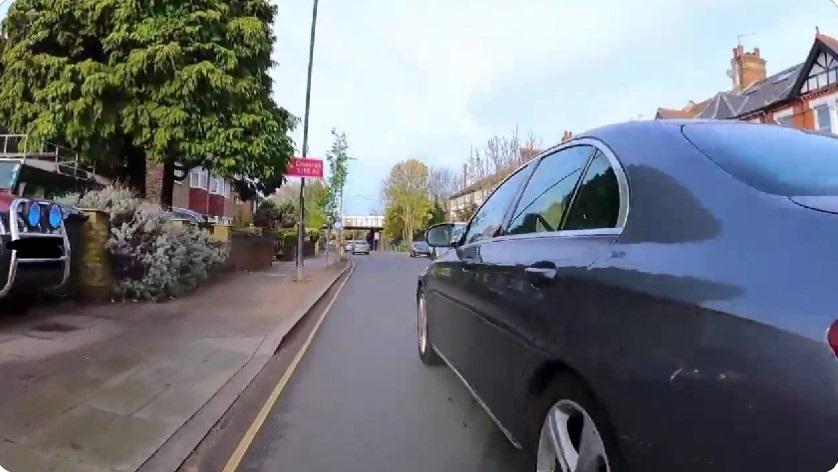
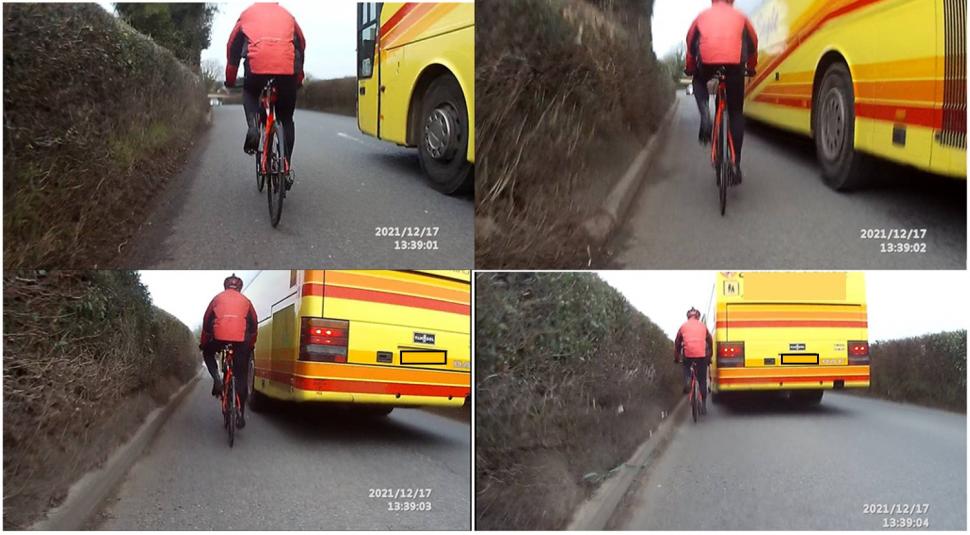
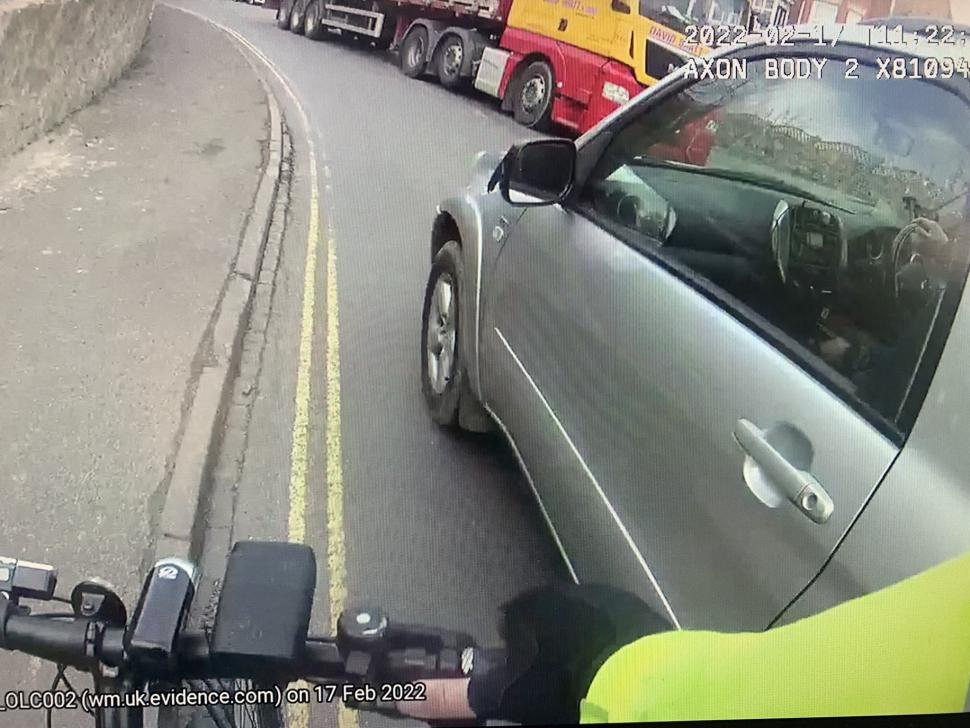
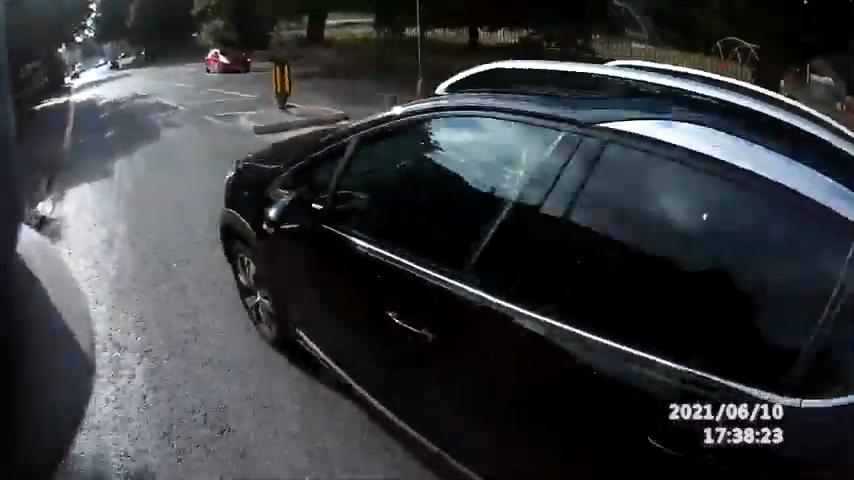
Add new comment
46 comments
Such articles always bring out the tribal in people, and especially claims of superiority. The report is based on a tiny number of people and we know nothing about how they were recruited. The writers are far from objective. Few cyclists have anything to proud of. I despair at the attitudes and behaviours of fellow cyclists, poor communication, thoughtless road positioning, no anticipation, riding two abreast on principle, and the quickness to get verbally abusive. No wonder drivers loathe us.
'Close passing' is a legal construct now. Who ever thought that defining a specific distance and prosecuting people over missing it wasn't doing it to improve safety but to create conflict and give the police cheap convictions. It isn't rational given how we cyclists filter and pass on-coming cars. The overwhelming majority of the reported are non-consequential and only existed as dangerous in the imagining of the reporter. Reports are certainly not improving relationships on the roads. It's disingenuous to claim otherwise. If you are bothered by driver behaviour look at those around you poisoning the atmosphere.
Agree that small numbers are normally a warning sign.
Now - eyes down: abreast, abusive, filtering as undertaking - can snitching be far behind? Ah - there it is with a confident "...overwhelming majority of the reported are non-consequential..." (nice dash of "not real crime" there too!)
Well clearly it's a heavy burden on you and I - being Good Cyclists! It's on *us* of course to try our best to "improve relationships on the roads" (with cars, not drivers presumably - as the latter aren't involved in crashes according to many media reports). And to counter all that poison! (Presumably from the Bad Cyclists, unaccountably still members of our club...)
For all the bears/woods/pope's/Conan Doyle detective comments, bear in mind organisations ought to be basing policy on good evidence. Yes, the result of the study is obvious - but being the festive season, let's congratulate them on taking the time to ensure we know can cite it as definitely a thing, rather than just opinion!
It's called empathy isn't it? If you cycle you are less likely to close pass another cyclist.
Yes, vicious circles are a thing.
But they're encouraged and used by those (capitalists and their politicians) who profit from an individualised, fragmented, fearful society.
Many years ago, there was a study that ran over several years at the cost in the hundreds of thousand pounds area in to LGV accidents.
It found that most LGV accidents happened while the vehicle was being reversed, and that building strikes where the most common factor.
They counted the vehicle impacting the loading dock/ bay buffers as a collision.
In order to use certain loading plates (they enable the forklift to leave the warehouse and safely drive on to the vehicle), the vehicle had to be as close as possible to the building ... so it was common and established practice to gently bump the building and hit the brakes
The study in this article brings out the same 'no shit, Sherlock' response.
Why do expressions about bears, woods, the Pope, and Catholics all come to mind…?
I cycle, I also drive a truck and tractors and i think i give cyclists plenty of room.
Its the same with horses, Its about common sense. I think its improving on the drivers side but its a 2 way street their a minorities on eitner side who ruin it
Half the issue is that there is a false equivolence that drivers have somehow persuaded themselves is valid. They think that cyclists behaving badly is the same as drivers behaving badly.
There will always be knobs in every group and the fact that delivery riders are now everywhere and are by far the worst cyclists I see doesn't help. The issue is that any sane individual doesn't tar a whole group with the same brush based on a small minority of idiots and yet I am constantly astonished at how many normal, level headed members of society hate cyclists. The fact that they are so happy to openly and directly admit it should shock people but it doesn't because its such a normalised view.
I like your word "equivolence".
Are you trying to suggest that minorities endanger drivers by close-passing them on their bikes?
What an idiot!
Outrage I tell you, manufactured of course. As per.
Common sense is great; unfortunately at population level it never seems to be common enough. Or perhaps society does not incentivise the sensible, careful behaviours enough, or is too lenient about those behaviours with a risk of negative consequences to others?
Your statement comes across a bit like a Trumpian "some good people on both sides" though. It may be a 2 way street - say with some people cycling near the centreline or a bit slower than others would like (annoying / inconvenient). However those others are often driving large vehicles which take up more than a lane. At speed. With A pillars in the way of their vision (and able to hear less than someone wearing headphones...).
The problem is the asymmetry in potential harms. Motor vehicles are much more risk to everyone outside them* in our public spaces than cyclists are. Plus they bring other problems e.g. space requirements, noise and pollution. Last thing I checked cyclists weren't regularly damaging buildings, road furniture or trashing roads either. (To be fair the last is mostly on the buses and trucks.)
(Cyclists are - per all the stats I'm aware of - much less of a risk to pedestrians than motor vehicles [a sense of the scale here although obviously many fewer trips being cycled]. Indeed the risks on collision may be similar.)
That's not quite the whole story because if someone has genuinely ridden recklessly (say a delivery dude cutting through a red light, on the wrong side of the road) and despite driving sensibly I ran them over that would have a serious impact on me also (I'm not a monster...). Plus society steps in, so someone who gets themselves seriously injured via their own recklessness means we all have to pay a fraction more.
OTOH if I don't drive that trip, I don't run that risk...
* At population level motorists are also a danger to other motorists and themselves, because speed.
Improving on the drivers side? Are you sure? And it isn't a two way street. It isn't cyclists that kill or injure 80 people a day, every fucking day. Every Tom Dick or Harry will quite happily bang on about cyclists this, cyclists that. But does anyone ever admit to bad driving? Does anyone ever try to improve their driving?
Pro tip for all drivers...if you close pass a cyclist, its never their fault. There is no blame to apportion. Not even a little. The only time its their fault is if they see you and swerve out to try and hit you. which lets be fair, never happens.
Oh and your shitty view that cyclists shouldn't be on the road doesn't apportion blame on them, that just makes you a fuckwit.
True 99% of the time but I wouldn't say "never". I've seen (rarely, admittedly) scenarios where a driver has been giving a cyclist 150 cm or more and the cyclist has unexpectedly swerved towards the middle of the road and manufactured a close pass due to poor bike handling, lack of concentration or a poor reaction to a hazard. Heaven knows I'm no petrolhead but I don't think it helps our cause as cyclists to claim that every rider is blameless in such a situation, there are incompetent riders out there just as there are incompetent drivers.
Thats the very reason for the 150cm gap though. If you are leaving a cyclist 150cm then they would have to have an absolute whopper of a wobble to make it dangerous and at that point its not a close pass. A close pass is when a driver doesn't leave you enough space through their choices.
Thats the whole point of safe overtaking. You are making sure that nothing you do is contributing to making the situation more dangerous for the cyclist and increasing the margin of error for any actions they take out of the blue.
I don't think any cyclist would claim a "close pass" if a driver gives you loads of room and the cyclist swerves hugely and closes that gap.
Well… I have seen a cyclist in Richmond Park completely lose his shit with a driver who was passing at a safe distance when the cyclist swerved out big time to avoid a pothole and nearly bumped into the side of the car - he then lost his shit with me when I (riding behind) told him to leave the driver alone because it was actually his fault. I agree it's vanishingly rare but I still can't agree that it's "never" a cyclist's fault.
I suspect your ability to judge 1.5m is extremely poor. Richmond park would require you to move fully over to the other lane in order to meet this requirement, I also suspect you followed the previous car to close and planed the cyclist (were each car gets closer as they pass). Your very likely demonstrating exactly what the article is describing
What a very peculiar comment. Firstly, the car that came into conflict with the cyclist was completely on the other side of the road (if you want to check whether there is room to do this, it was on Queen's Road going towards Kingston Gate, where the road is approximately 6 m wide); secondly, I wasn't in a car (I don't own one), I was cycling. Perhaps don't go rushing to conclusions in your desire to hand out pompous lectures in future?
Doesn't follow on at all from what Rendel wrote and what does 'planed the cyclist' even mean ?
File in the "No Shit, Sherlock" section.
Glad to see you back your assessment with quantitative data.
Why has the Department for Transport done so little to advertise such big changes in the Highway Code?
Motoring organisations (e.g. IAM Roadsmart) and the mainstream media have loudly cried for the DfT to advertise the Highway Code changes regarding cyclists, the hierarchy of road users, etc.
https://www.iamcommercial.co.uk/wp-content/uploads/Highway-Code-2022_3_flipped.pdf
That was a massivle failure on the Govt.'s part, but this specifically isn't anything to do with the new HC changes. The last time I got into with an argument with a someone upset at having to give cyclists more room "now", I found a copy of the HC from 1931 that mentions passing cyclists with plenty of space so as not to endanger them.
This is nothing new and there is no justification for not knowing about it. This has been an expectation of drivers for as long as there have been drivers.
I desperately want this argument to have been conducted at 15mph, with you waving a yellowed transport document through a driver's window.
Online unfortunatley, but I also prefer your version.
Had a heated discussion regarding the recent updates with my sis. She couldn't accept that all the 'changes' were basically clarifications and clearer wording of previous guidelines. It seems that cyclists filtering is a particular challenging scenario for her.
It highlights – not that RoadCC readers need reminding – the need for the Department of Transport to promote and advertise the latest Highway Code’s revised rules.
Moreover, it’s unreasonable to change the rules of the road without an accompanying advertising campaign. Without it, we have new drivers who will know the latest rules on the same roads as others who aren’t up to date. It’s a recipe for chaos.
Indeed. Walking to work I cross many side streets. Drivers seldom give way graciously, so rain or shine I carry my (full size) umbrella pointy end akimbo - they reluctantly take more notice of that, all the while remonstrating through the windscreen at me to confirm their ignorance of the Highway Code.
Pages